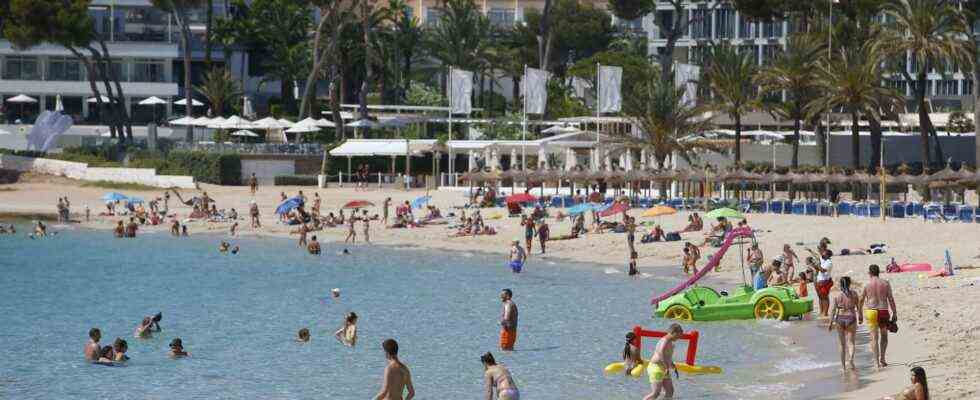Status: 03.07.2021 03:20 a.m.
Spain is one of the main travel destinations for Germans. And German vacationers are important to the Spanish economy. But how does the vacation work under Corona conditions?
From Oliver Neuroth,
ARD studio Madrid
At first glance, Playa de Palma on Mallorca is back to normal: the famous beach east of the island’s capital is well filled, and so are the outdoor areas of the bars and restaurants on the promenade behind it. Here and there there are even queues of holidaymakers waiting for a free table.
The “drinking tourists” are also back
There are hardly any restrictions on gastronomy on the island. Frank Winkler can watch the hustle and bustle in the tourist stronghold from his apartment. The Berliner is spokesman for the neighborhood association Playa de Palma. “The whole subject of tourism is back,” he says. “Of course we have families who are very welcome. What is not so welcome is this drinking tourism. But it is already in full swing.”
Even if discos and clubs on Mallorca are not supposed to reopen until mid-July, the first excesses of party have already occurred: groups of holidaymakers have celebrated with heavy alcohol at night on the beach mile – anything but Corona-compliant.
Incidence value on Mallorca is rising again
“The English, the Dutch and the German tourists – at least some of them – set the level,” says Winkler. “And the Spanish youth are not lagging behind.”
Young Spaniards in particular are making headlines on Mallorca: They celebrated their school-leaving qualifications in large groups on the island and thus caused a corona outbreak. More than 2,000 young people have now tested positive for the virus, most of them on their return to the mainland.
But also on Mallorca and the other Balearic islands themselves, the corona numbers are increasing faster and faster, the seven-day incidence is around 70. From Wednesday to Thursday alone, the authorities have recorded more than 300 new corona cases. It is a setback for the regional government. In the past few months, she had only slowly relaxed the corona restrictions in order not to endanger the important summer season. But if the trend continues, that’s exactly what threatens.
The classification of Catalonia has hardly any consequences
The region of Catalonia will be back on the German list of corona risk areas from Sunday. This has hardly any consequences for holidaymakers: you have to do a corona test before you return to Germany anyway, so there is no quarantine obligation. However, the classification as a risk area means that the Federal Foreign Office advises against travel.
The corona situation is also developing unfavorably in the Canaries. The seven-day incidence is around 65. However, tourist life in Gran Canaria, Tenerife and Co. is largely normal. Canary Islands President Angel Victor Torres hopes that no vacationer cancels his trip at short notice. “Our islands are particularly beautiful now. It rained heavily in winter, so many of the islands are green and the fauna has recovered on the beaches. We offer temperatures of at least 20 degrees 365 days a year.”
Tourism important to Spain’s economy
Spain advertises massively for holidaymakers, as they are the country’s economic mainstay. The government has largely overturned the mask requirement in the open air and relaxed the entry rules: Those who come from Germany no longer have to present a negative corona test.
British tourists, on the other hand, do: Spain wants to prevent the widespread and dangerous delta variant of the corona virus from being introduced in Great Britain. In the second half of June, their share in Spain was around 30 percent. Since the samples are comparatively seldom sequenced in Spanish laboratories, i.e. the coronavirus type is determined, experts assume a higher rate.
If Germany were to classify Spain as a virus variant area, that would mean: forced quarantine for returnees – and that would be a total loss for the tourist summer.
The Corona variants and their names
The World Health Organization (WHO) is now using neutral names for the variants of the coronavirus. They are no longer to be named after the countries in which they were first discovered. With this, the WHO wants to prevent discrimination and stigmatization.
alpha The name of the variant that first appeared in Great Britain is B.1.1.7.
beta is the name for the variant B.1.351 discovered in South Africa.
gamma stands for variant P.1, which has been proven in Brazil.
delta refers to variant B.1.617.2, which was initially found in India.

